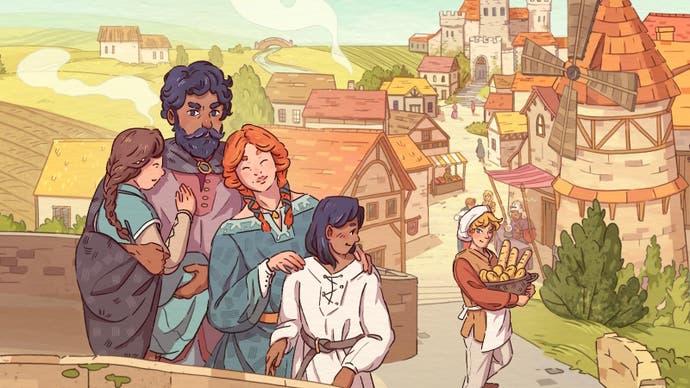Lakeburg Legacies review - competent village management missing a spark
Love is in the heir.
Dating and relationship mechanics have become almost expected in visual novels and modern RPGs, but it's when other genres dip their toes into it that my interest is highest, like the weird melding of horror and anime waifus in Doki Doki Literature Club, or the roguelike combat paired with romance in Hades. So when I saw Lakeburg Legacies' cosy setting and inclusive roster of characters had a focus on playing matchmaker and using that love to manage a village, I was hopeful for a more intimate experience in a genre usually pretty detached from its pawn-like citizens.
The first few hours absolutely fulfilled this promise when I was following Adelina and Maryon's tumultuous marriage. Adelina was my very first villager and I immediately put her to work as a lumberjack so I could get wood to start the expansion of my currently miniscule village. Pretty standard management stuff, but then I was introduced to the couples mechanic, where you get the help of local mystic, Tindra, and her soulmate pairing abilities.
As her name suggests, Tundra's basically a one-woman Medieval version of Tinder. Adelina and Maryon went on a date, got married, fell madly in love, and had a baby on the way in no time. Then, Maryon started flirting with every villager that crossed her path. My eyes were glued to the journal in between building farms and sewing workshops, eager to see who Maryon was going to set her charms on next. During this time Adelina and Maryon's child, Christina, took an instant dislike to neighbour Victorin for some reason. This became a problem when Christina grew up and joined Adelina and Victorin in the lumberjack lodge, adding a 'bad' working atmosphere due to their animosity, which affected the production of Lakeburg's precious wood.
It was fun! Lakeburg Legacies was combining the calculating gameplay of managing resources with the personal touch of relationship building, and I was watching it all play out while on the enjoyable loop of building my village into something more substantial. For those first few hours it really felt like this was my personal village, where I could eventually swap stories with other players to see what their citizens were up to. Who cheated on who? Why? What were your dates like? Who did you make King and Queen?
Then, not long after Adelina and Maryon divorced, another rocky marriage made its presence known in my journal… and another child took a dislike to a neighbour… then another cheating couple popped up. With little to no variation in how this all played out, reading about my villagers' lives soon became tedious. This wouldn't be such a problem if their lives had significant impact elsewhere, but they don't - people are just another resource.
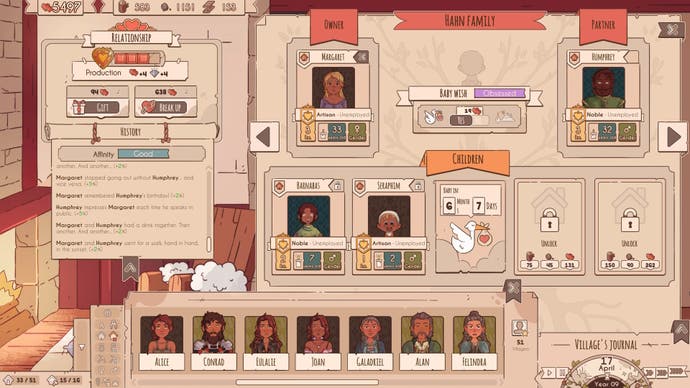
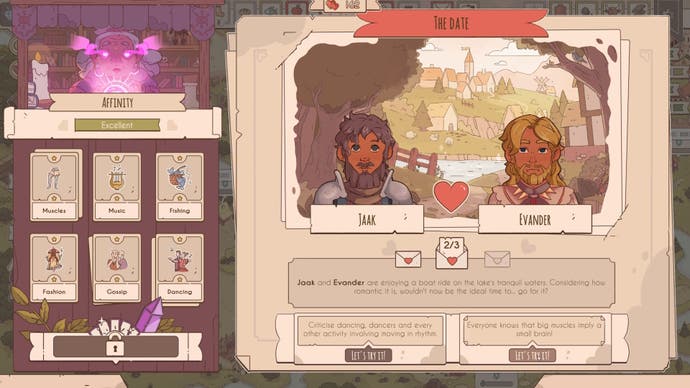
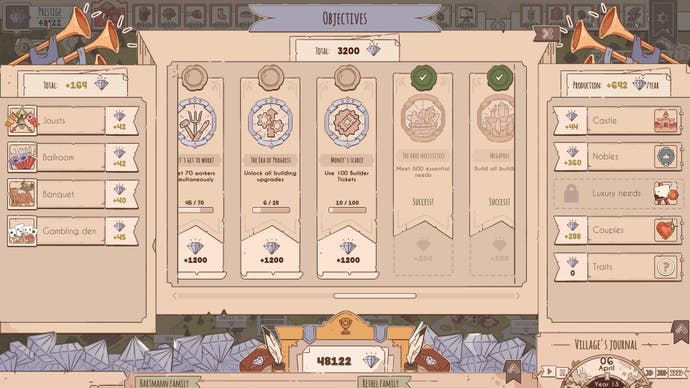
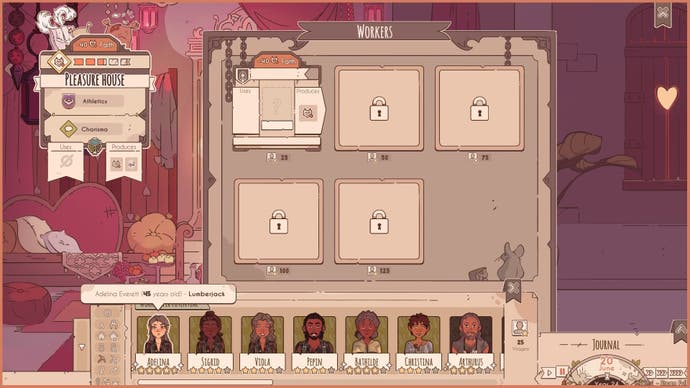
If a couple breaks up, you don't generate hearts from them any more, which is a resource needed to keep swiping right at Tindra's to find a good couple match, or to spend on failing marriages to give them gifts and hopefully keep them afloat a little longer. However, all you have to do is couple-up again if a pair gets divorced. Sure, you need those hearts to find a good match, or a villager with the right skills to produce more resources, but in a way that's what makes it pointless: I need good couples to generate hearts so I can get good couples. With no relationship or story reason to do this, I'm farming my villagers while they're farming the land. Even the royal couple just sits there and produces materials for me, with no special stories or relationships to experience. The only motivation Lakeburg Legacies gives you for doing any of this past your own enjoyment is to earn Prestige, which rewards points at the end of a game so you can unlock artwork. There's not even a 'here's how you did' menu after your final year - your game is wiped, you get points, and that's it.
It's a good thing then that even with the forgettable hook and complete save wipe that the core gameplay of Lakeburg Legacies is enjoyable enough. There are lots of plates to spin as you try to balance the materials your village needs for both survival and to keep its citizens happy. Although there are 18 individual resources you need to balance by the end of the game, it's actually fairly easy to do so, as they're introduced over time and all you have to do to increase production is hire more workers or improve the building.
My own personal struggle came with making villagers happy. For two thirds of the game I had somehow managed to recruit the most miserable personalities alive and was a little confused about what was going wrong. The stats in the happiness bars didn't seem to match up with how sad they all were, but then I finally got round to opening a painter's workshop and lowering taxes slightly and suddenly Lakeburg was nirvana.
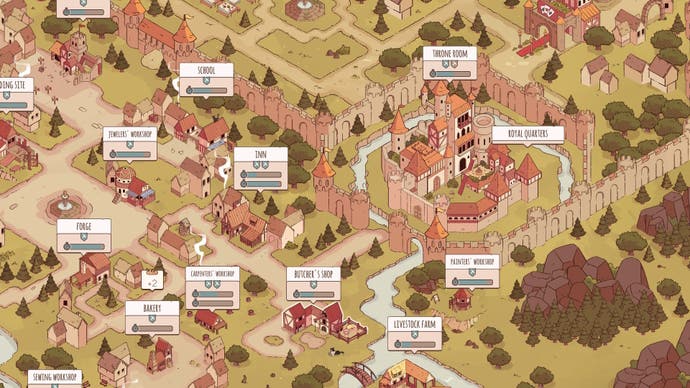
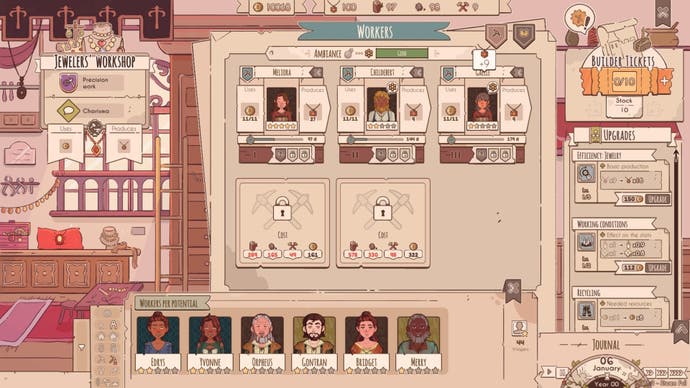
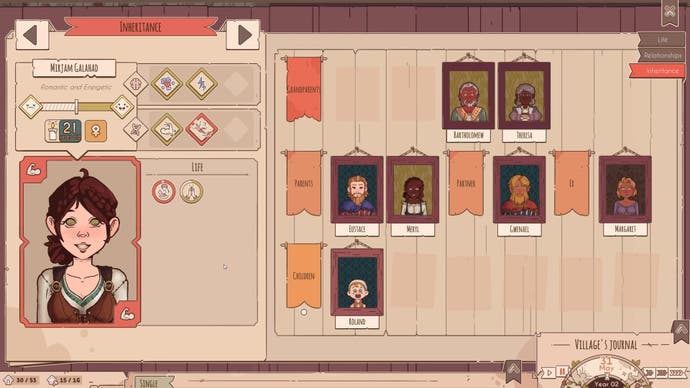
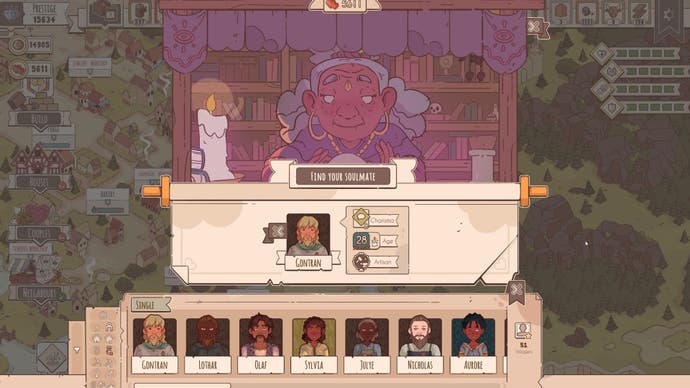
There are other welcome touches that help the experience feel different enough. Like lumberjacks and 'pleasure house' employees sharing the same skill sets, villagers' portraits ageing with them, the charming painting-inspired art style, jaunty flute and string melodies, and no limitations on who your citizens can marry or fall in love with. Same-sex relationships are included, encouraged, and mechanically no different than heterosexual couples. Every pair can have a baby that grows up to hate the neighbours just the same. I don't know if I'd call Lakeburg Legacies a wholesome experience due to the town's penchant for adultery, but these touches certainly create a fun, chilled atmosphere that help distract from the lack of variation in social interactions and innovations to gameplay.
Take out the squandered appeal of tracking your citizens' love lives and we're left with a capable village management sim set in the Middle Ages with a nice vibe. I enjoyed my 12 hours in Lakeburg, but with only the promise of more unlockable pictures, a save wipe, and some more identikit villagers, I don't have a lot of motivation to start over. So long Lakeburg, I'll never forget your love of paintings and low taxes.
